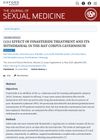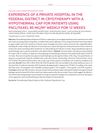Search
for
Sort by
Research
510-540 / 547 resultsresearch Role of Serum Androgens and Prostate-Specific Antigen Levels in Men with Androgenetic Alopecia
Higher testosterone and DHT levels are linked to hair loss in men, but not to prostate cancer risk.

research Improvement of Androgenic Alopecia by Extracellular Vesicles Secreted from Hyaluronic Acid-Stimulated Induced Mesenchymal Stem Cells
HA-stimulated stem cell vesicles improved hair growth in male mice with androgenetic alopecia.
research Physical Treatments and Therapies for Androgenetic Alopecia
Low-level laser therapy is the most supported treatment for hair loss, but other methods show promise.
research Not Everything Is Telogen Effluvium. Diffuse Alopecia Areata: An Underdiagnosed Entity
Accurate diagnosis of hair loss types is crucial for effective treatment.
research Microarray Gene Expression Analysis of Lesional Skin in Canine Pemphigus Foliaceus
Canine pemphigus foliaceus involves significant immune activity and shares similarities with human pemphigus.

research Alopecias: Practical Tips for the Management of Biopsies and Main Diagnostic Clues for General Pathologists and Dermatopathologists
The document concludes that understanding hair follicle histology and the hair cycle is crucial for diagnosing alopecia.
research Resolution of Refractory Generalized Granuloma Annulare After Treatment With Alitretinoin
Alitretinoin helped clear up a skin condition called generalized granuloma annulare in an elderly man.

research Frontal Fibrosing Alopecia and Discoid Lupus Erythematosus: More Than a Coincidence
The conclusion is that having both Frontal Fibrosing Alopecia and Discoid Lupus Erythematosus may suggest a shared immune response in certain people, and a mix of antimalarial drugs and 5-alfa-reductase inhibitors is recommended for treatment.
research Topical Calcipotriol Mixed with Topical Steroid Versus Topical Steroid Alone in Treatment of Alopecia Areata
Mixing calcipotriol with a steroid is almost as effective as using a steroid alone for alopecia areata and has fewer side effects.
research Prostate Cancer and Androgenic Alopecia: The Role of Finasteride as a Dual Agent
Finasteride treats hair loss and reduces prostate cancer risk.
research Biochemical Approach on the Conservation of Drug Molecules During Hair Fiber Formation
Drugs can be incorporated into hair based on their chemical properties and hair pigmentation.
research French Administrative Health Care Database (SNDS): The Value of Its Enrichment
Enriching the French health care database with external data greatly improved its usefulness.
research Trichodysplasia Spinulosa: A Polyomavirus Infection Specifically Targeting Follicular Keratinocytes in Immunocompromised Patients
Trichodysplasia spinulosa is a rare skin disease in immunocompromised patients caused by a specific virus targeting hair follicle cells.

research Toxicity Profile of Antibody-Drug Conjugates in Breast Cancer: Practical Considerations
ADCs can effectively treat breast cancer but may cause side effects like nausea and hair loss.

research Rare and Common Manifestations of COVID-19 in Children
COVID-19 can cause various skin issues in children, mostly not severe, with chilblain-like lesions being common, especially in adolescents.

research Polymorphisms of Vitamin D Receptor and the Effect on Metabolic and Endocrine Abnormalities in Polycystic Ovary Syndrome: A Review
Different forms of the Vitamin D receptor can impact metabolic and hormone issues in Polycystic Ovary Syndrome.
research Androgenetic Alopecia in Women and Men: Italian Guidelines Adapted from European Dermatology Forum/European Academy of Dermatology and Venereology Guidelines
Italian guidelines recommend using trichoscopy for diagnosis and treatments like minoxidil for hair loss.
research Capillary Gas-Chromatographic Determination of Spermidine in Hair Lotion
The method effectively measures spermidine in hair lotions.

research Effect of Finasteride Treatment and Its Withdrawal in the Rat Corpus Cavernosum
Finasteride treatment may cause erectile dysfunction, but stopping it reverses these effects.

research Glutamic Acid Promotes Hair Growth in Mice
Glutamic acid helps mice grow hair.
research Lineage-Committed Fibroblast Populations Are More Efficient at Regenerating Hair Follicles in Chamber Grafting Assays Compared to Undifferentiated Embryonic Fibroblasts
Differentiated fibroblasts regenerate hair follicles better than undifferentiated ones.
research The Hair in Childhood and Old Age
Hair growth issues can be linked to genetics, diseases, or medications, and new treatments are being developed.
research Efficacy of a New Combination of a Microemulsion and Oral Supplementation for Androgenetic Alopecia: An Interventional Multicentric Study
The new treatment improved hair growth and thickness in people with hair loss.
research The Impact of COVID-19 on the Menstrual Cycle: A General Perspective
The combination tablet of finasteride and doxazosin works the same as taking each drug separately.

research Polycystic Ovaries: Findings of Pelvic Ultrasonographies in an Image Examination Clinic in Natal, Rio Grande do Norte, Brazil
Many women in Natal, Brazil, have polycystic ovaries according to ultrasound scans.
research A Cross-Sectional Study of Clinical, Dermoscopic, Histopathological, and Molecular Patterns of Scalp Melanoma in Patients With or Without Androgenetic Alopecia
Scalp melanoma is often diagnosed late in people with hair loss, leading to worse outcomes.
research Topical Polyhydroxy Acid Treatment for Autosomal Recessive Congenital Ichthyosis in the Golden Retriever: A Prospective Pilot Study
Gluconolactone products can significantly reduce skin scaling in golden retrievers with ARCI.

research Experience of a Private Hospital in the Federal District in Cryotherapy with a Hypothermal Cap for Patients Using Paclitaxel 80 mg/m² Weekly for 12 Weeks
Scalp cooling therapy helped over 80% of women keep at least half their hair during chemotherapy.

research Five-Alpha Reductase Inhibitor and Breast Cancer Risk in Men: A Systematic Review
Taking 5-alpha reductase inhibitors does not increase breast cancer risk in men.